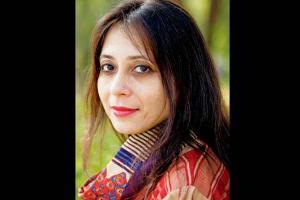A story of our times, Annie Zaidi's new novel takes us into a peaceful town where bigots are using history as ammo to fuel hate

Annie Zaidi
Three hundred years' worth of stories, clogging up the arteries of our men. Sitting tight around their hearts, slimy and thick with half-truths." Reading and re-reading these lines from a soliloquy by Devaki, a character in Annie Zaidi's new novel, Prelude To A Riot (Aleph Book Company), we are reminded of social media, where bigotry has become the norm. Self-appointed spokespersons of the powers that be are claiming that history has been unfair to them, and that the only way to rewrite the wrongs is to change our politics. Those on the fringes are seething—questioning this new truth, fighting this radicalisation. With every new post, hate is growing and clogging our timelines. Meanwhile, everyone is waiting, as if for the perfect time, when this will all come together and translate into something more sinister—it's like the prelude to the riot in Zaidi's novel.
The book is set in an unnamed peaceful southern town, surrounded by spice plantations. Three generations of two families, one Hindu and the other Muslim, coexist here, and among them, some even share a close friendship. But the spectre of religious intolerance threatens to haunt this community, in the guise of the Self-Respect Forum "whose mission is to divide the town and destroy the delicate balance". At risk are Dada, the owner of an estate; his grandchildren, Abu and Fareeda; the newly married Devaki, who is unable to comprehend how her husband, brother and father are turning into fanatics; Mariam, the gifted masseur and her lover, the bakery owner Kadir, and Garuda, the high-school teacher who is desperate to impart the truth about the country's history to his disinterested class. "The seed for many of these characters comes from a research trip I undertook a few years ago," says the Mumbai-based journalist and playwright. "This was not an area already branded as a flashpoint for disharmony or hate crimes. On the surface, all was well. But every time I talked to people for more than five minutes, something tumbled out of them—either bigotry or fear or anti-history rhetoric. It was very disorienting, because people were polite, hospitable. I also found that I could not challenge anyone in the moment. I didn't have the courage or even the full understanding of what was unfolding before me. That place, its corners, the way it was laid out and who lived where, it just got to me. I spent a long time processing what I heard and saw.
Writing the novel was a part of a process of figuring out what was running in the nerves of that town."
Zaidi, who recently won the prestigious Nine Dots Prize for her essay Bread, Cement, Cactus, is no stranger to the art of storytelling—her previous fiction includes Gulab and Love Stories # 1 to 14. But, with this novel, she uses the power of her unflinching prose, to show us a mirror to our society. "I think writers are almost always heavily invested in their own times," she says. "I only know that it [her novel] derives from the times I'm living in, and from places and things I've witnessed." It's also about history, she says, and how we derive our sense of ourselves from the stories we've been told about who 'we' are. "History can turn into a source of local pride, or it can turn into ammunition that feeds conflicts centuries after they should have ceased to matter."
Her narrative is brimming with voices—a collection of soliloquies—with every character telling us the story, sometimes of the same event, from their point of view. The idea, she says, was not to represent or justify any character's actions. "What I did want to do is capture, as accurately as possible, the sort of arguments I've heard from people, and what these arguments do to them—to their own soul, to their families, before they start to hurt others. I did choose the device of the internal monologue though, perhaps because I wanted to hear how these characters must talk to themselves. The thing about disturbing outcomes is that they usually come from a place of internal disturbance, and usually the sources of this disquiet turn out to be far removed from what is stated in public," says Zaidi. Her favourite is Fareeda, a young Muslim girl, orphaned as a child, who vows to look after her grandfather's estate, because she fears her brother doesn't want anything to do with it. "She is a wise, spirited child—the sort of girl you want to people the world with," she says.
The book began as a short story, but a writer friend looked at it and told Zaidi, "there was something bigger here. So I kept adding more perspectives. It's taken about three years," she says.
At the end, we only see the prelude, and maybe that's the relief this novel needs. Because, through Zaidi's characters, we see the forces that are coming, and none of them bring good news.
Catch up on all the latest Mumbai news, crime news, current affairs, and also a complete guide on Mumbai from food to things to do and events across the city here. Also download the new mid-day Android and iOS apps to get latest updates
 Subscribe today by clicking the link and stay updated with the latest news!" Click here!
Subscribe today by clicking the link and stay updated with the latest news!" Click here!









